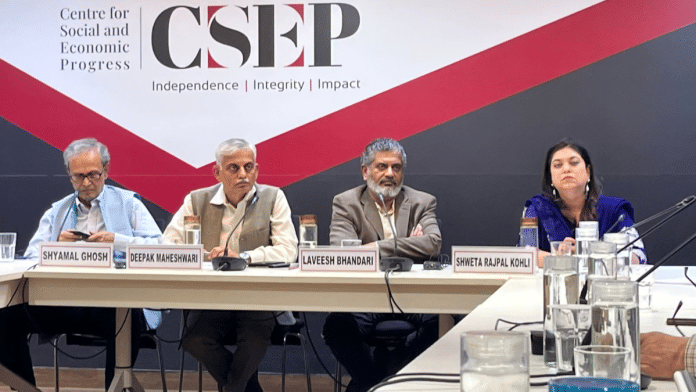New Delhi: India’s digital ecosystem is facing a governance issue, with overlapping roles of ministries, departments and regulatory agencies creating confusion and slowing down the country’s technological progress, former government officials have said.
Former telecom secretary Shyamal Ghosh, speaking at a seminar by the Centre for Social and Economic Progress (CSEP) Thursday, said fragmented governance structures slow down growth.
“If we give a freehand to human enterprise, then it will flourish. But there should be some rules for businesses,” he said, as a panel discussed CSEP’s report titled ‘Governing Digital India: A Report on Institutions and Instruments’.
For instance, Ghosh said, “In India, the software industry grew due to the efforts of NASSCOM (National Association of Software and Service Companies). Regulations or the government came in later.”
Ghosh was secretary in the telecom ministry under then Union Minister Pramod Mahajan from February 2000 to May 2002.
The CSEP report also makes a case for simpler governance.
Subjects such as data protection and artificial intelligence (AI) are primarily managed by the Ministry of Electronics and Information Technology (MeitY). But the responsibility of AI oversight is shared among the Department for Promotion of Industry and Internal Trade (DPIIT), Prime Minister’s Economic Advisory Council, Ministry of Consumer Affairs and Niti Aayog, the report says.
Similarly, issues related to cybersecurity are governed by the National Security Council Secretariat, Department of Telecommunications (DoT), MeitY and the Union Ministry of Home Affairs.
“Why should we have so many ministries, departments and people? After many years in bureaucracy, I have come to the belief that no governance is the best governance,” Ghosh said.
CSEP senior policy adviser and the report’s author Deepak Maheshwari said overlaps among ministries create ambiguity around accountability and ownership. “Multiple ministries and departments blur boundaries, which creates ambiguity around ownership and accountability of certain subject matter, difficulties in doing business and confusion for stakeholders,” he said.
Former MeitY secretary Ajay Prakash Sawhney, who attended the seminar via video conference, argued that each ministry deals with unique challenges.
“While MeiTY has its wings spread out with start-ups, cybersecurity, data protection and others, the telecom ministry is dealing with giants of industry and the information and broadcasting ministry is dealing with media, which is a sensitive subject,” he said.
Sawhney added, “India is not like Singapore, it is far more complex and bigger in size to be governed by a single ministry.”
But the former MeitY secretary, who was at the post from June 2017 to February 2022, endorsed the need for lighter regulations in the digital landscape to allow businesses to flourish.
To ease overlaps and confusion, Maheshwari proposed ‘one ministry, one law, one regulator, one tribunal’ as one of the possible solutions. “An option can be to integrate telecom, broadcasting and IT under a single ministry, such as the Ministry of Digital Ecosystem (MoDE)”, he said.
But former MeitY secretary Sawhney pushed back on the idea of one ministry. “While it is a wonderful idea to combine everything into one ministry, it is fairly complex,” he said, adding that two ministries might be a more feasible option given the rapid evolution of technologies.
Sawhney pitched for the need to have better coordination and communication among different departments while framing policies.
Varadharajan Sridhar, professor of IT and public policy at the International Institute of Information Technology in Bengaluru, suggested having one ministry along with multiple regulators and tribunals.
“We must split the regulatory bodies according to the technicalities, so there will be multiple regulators each having their own tribunals to address any issue,” Sridhar, who also participated in the seminar virtually, said.
(Edited by Prerna Madan)
Also Read: Digital wallets are making sure that Indian students get their scholarship on time






